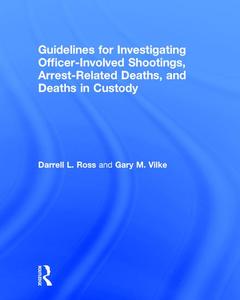Guidelines for Investigating Officer-Involved Shootings, Arrest-Related Deaths, and Deaths in Custody Routledge Series on Practical and Evidence-Based Policing Series
Auteurs : Ross Darrell L., Vilke Gary M.

As unrest over officer-involved shootings and deaths in custody takes center stage in conversations about policing and the criminal justice system, Guidelines for Investigating Officer-Involved Shootings, Arrest-RelatedDeaths, and Deaths in Custody addresses critical investigation components from an expert witness perspective, providing the insights necessary to ensure a complete investigation. Investigating a custodial death or an officer involved in a shooting presents unique and complex issues: estate, community, judicial, agency, involved officer, and public policy interests are all at stake. These types of deaths present various emerging medical, psychological, legal and liability, technical, and investigatory issues that must be addressed through a comprehensive investigation. This book is ideal for students in criminal investigation, death investigation, crime scene investigation, and special topic courses in custodial deaths and officer-involved shootings, as well as for death investigators, law enforcement officers, police administrators, and attorneys.
Preface
1. Arrest-Related Deaths, Emerging Questions, and Competing Expectations in Investigations
Darrell L. Ross, Michael Brave, and Mark Kroll
2.Vital Statistics and Arrest-Related Deaths
Darrell L. Ross and Michael Brave
3. Legal and Liability Issues Surrounding the Use of Force
Darrell L. Ross
4. Stress, Perceptional Distortions, and Human Performance
Darrell L. Ross and Randall L. Murphy
5. Memory and Decision Making Under Stress
Alexis Artwohl
6. Officer-Involved Incident Investigation Guidelines
Darrell L. Ross and Mark S. Dunston
7. Positional and Restraint Asphyxia
Davut Savaser and Theodore C. Chan
8. Neck Holds
Michael Holman and Gary M. Vilke
9. Excited Delirium Syndrome (ExDS)
Christopher J. Coyne, Binh T. Ly, and Gary M. Vilke
10. Amphetamines, Cathinones (Bath Salts), and Cocaine
Stephen L. Thornton, Michael A. Darracq, and Binh T. Ly
11. Central Nervous System Depressants
Michael A. Darracq, Stephen L. Thornton, and Binh T. Ly
12. Less Lethal Weapons, Not Including TASER
Christian Sloane and Gary M. Vilke
13. TASER—Conducted Electrical Weapons
Mark W. Kroll and Michael A. Brave
14. Custodial Deaths in Detention
Darrell L. Ross
15. Conducting the Investigative Interview
R. Edward Geiselman, James F. Wilson, and Alexis Artwohl
16. Effective Agency Response to the Media in Use of Force Incidents
Todd A. Lough
Index
Darrell L. Ross, Ph.D., is a Professor and Department Head of Sociology, Anthropology, and Criminal Justice, and the Director of the Center for Applied Social Sciences (CASS) at Valdosta State University. Ross worked for the Michigan Department of Corrections as an officer, cell block supervisor of mentally impaired prisoners, probation officer, and instructor in the training academy. He also taught in the Police Academy at Ferris State University as a certified instructor teaching subject control techniques, mechanics of arrest, and responding to the mentally ill person. He directed the forensic science program at East Carolina University and served as the Director of the School of Law Enforcement and Justice Administration at Western Illinois University.
Ross has published over 95 articles, books, book chapters, and monographs on the use of force, stress, and human factors during use-of-force incidents, liability issues, officer-involved shootings, excited delirium syndrome, prone restraint and asphyxiation, sudden arrest-related deaths, and custodial suicides. Ross has provided technical assistance and consultation to local, county, state, federal, and private criminal justice agencies nationally and internationally, as well as to various branches of the military. He regularly provides training to line-level officers and administrators and makes presentations at national and international conferences on officer-involved shootings, use-of-force issues, sudden arrest-related deaths, and custodial deaths. Since 1987, Ross has provided expert witness services regarding these and other topics.
Gary M. Vilke, M.D., is a Professor in the Department of Emergency Medicine at the University of California, San Diego (UCSD) and is the former Medical Director for the County of San Diego Emergency Medical Services. Vilke served as the Director for Custody Services at UCSD for over 15 years and is the Director for Clinical Resea
Date de parution : 07-2017
18.7x23.5 cm
Date de parution : 07-2017
18.7x23.5 cm
Disponible chez l'éditeur (délai d'approvisionnement : 14 jours).
Prix indicatif 48,39 €
Ajouter au panierThèmes de Guidelines for Investigating Officer-Involved Shootings... :
Mots-clés :
Excited Delirium Syndrome; Oleoresin Capsicum; excited; Field Sobriety Testing; delirium; Excited Delirium; Michael Brave; Empty Hand Control Techniques; Mark Kroll; Involved Officers; Randall L; Murphy; Custodial Death; Alexis Artwohl; Riot Control Agents; Mark S; Dunston; Young Men; Davut Savaser; Crime Scene Technicians; Theodore C; Chan; Medicolegal Death Investigation; Michael Holman; Positional Asphyxia; Gary M; Vilke; Constant Physical Activity; Christopher J; Coyne; Emergency Medical Services Personnel; Binh T; Ly; Neck Hold; Stephen L; Thornton; Inattentional Blindness; Michael A; Darracq; Court Granted Summary Judgment; Christian Sloane; Sudden Cardiac Arrest; Mark W; Kroll; OC Spray; Michael A; Brave; Urine Drug Immunoassay Screens; R; Edward Geiselman; CI Protocol; James F; Wilson; Ois; Todd A; Lough; Qualified Immunity; Bar Hold; Methamphetamine Levels


